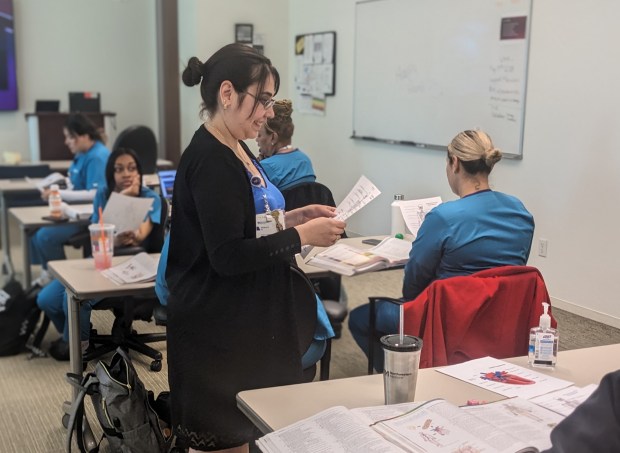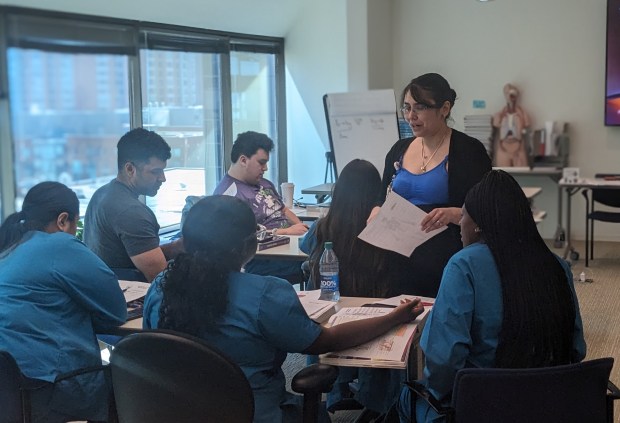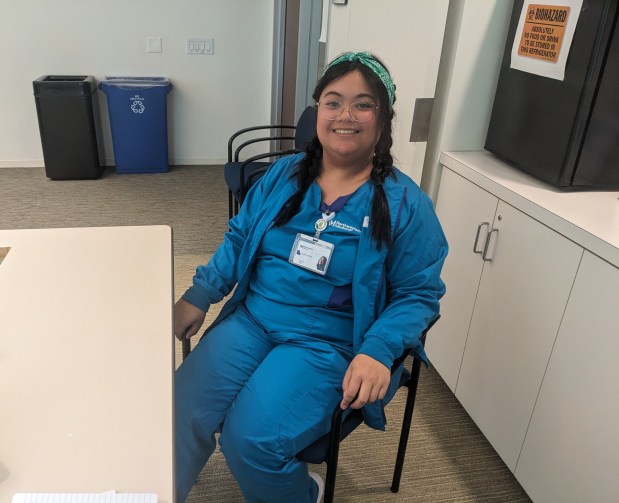Taking care of her dad after his two hip replacements awakened Jasmine Barnachea’s desire to be a nurse, but she needed a way to jumpstart her health care education.
So when Barnachea, a nutritional aide at Northwestern Medicine Palos Hospital, heard about the Basic Nursing Assistant Training Program, she applied and got in.
The program at Northwestern Medicine started in 2022 and is free to employees. It recently opened up to outside candidates as well, and offers a payment plan.
Once Barnachea completes her coursework, she will still need to take the Illinois Nurse Aide Competency Certificate Exam.
“The process of seeing someone go back to full health is nice,” said Barnachea about her father going from being in recovery to having a full recovery.
Barnachea said the classes were also a way to “get my toes wet.” But she already knows she enjoys working with patients and is considering a career as a labor and delivery nurse.
“I like the interactions with my patients,” Barnachea said. “I like that just a simple thing like, ‘Here’s a juice,’ can make a person happy.”
The program also addresses a nursing shortage, because patient care technicians, as the nursing assistants are called, help carry the load. Their duties can include tending to patients’ personal hygiene, transportation, taking vital signs and answering call buttons.
The U.S. Bureau of Labor Statistics estimates from 2022-2032 jobs for registered nurses are expected to grow by 6%. The Illinois Nursing Workforce Center projects the state will face a shortage of nearly 15,000 registered nurses by 2025.
Classes meet Fridays for 16 weeks at Northwestern in Chicago, and include simulation labs and clinical components. The curriculum covers anatomy and patient care skills, including taking blood pressure, grooming, dressing and more.
During a recent class, Johana Hernandez, program coordinator of Clinical Assistant Training Programs at Northwestern Medicine, asked students to identify various body parts from an anatomical chart and then discussed grooming and dressing techniques that should be followed in the hospital.
“What can you tell me about grooming?” she asked the students, then repeated some of their responses. “It helps with self-esteem. It feels good.”

There was also a sense of camaraderie in the class, both among students and between them and their teacher. But mostly there was an interest in patients and helping them get through hospital stays.
“I really like helping people,” said Daniel Sullivan, of Palos Heights, a dietary aide who also works in the call center taking dietary orders at Palos Hospital. “I love just the human interaction — hearing their stories, how they ended up there, letting them air out their feelings.
“It’s a stressful time being in the hospital.”
Sullivan said a recent clinical stint Northwestern downtown helped him and his fellow students learn charting and how to feed a patient.
Fellow student Brianna Stennis, of Blue Island, who also works at Palos Hospital as a nutrition and food service aid, said she was looking forward to one day being a labor and delivery nurse.
“I like being around people,” Stennis said. “I like seeing the smiles on their faces when I give them their food.”

Tacora Love, a Northwestern program director and nurse educator who helped create the program, said patient care technicians are essential in the operation of the hospital.
“They make all the difference in patient care,” Love said. “They’re with the patients the majority of time and are able to make observations and alert the staff right away if there are changes in our patients.
“They also build a relationship with the patients and the patients actually tell them more than they may tell the rest of the health care team.”
Love said once graduates pass the state exam, human resources works with them to help place them in jobs there. There have been 27 students who have graduated so far and half have gone on to nursing programs, she said.
The current students “are doing phenomenal,” she said, adding they are also learning time management, organization, emotional intelligence and computer skills.
Mark Mueller, who works in recovery at Palos Hospital, said he’s glad he went through the training. He used to work in food service and then transport at the hospital.
“What I liked the most was I felt like I always had someone to talk to…we had a really close bond with our teacher and between us as classmates,” Mueller said. “She (Tacora) helped me with my resume … and when I felt overwhelmed (in the recovery department), she talked me out of leaving.”
“I am glad I listened to her, she was right and I really like my job.”
Mueller also said he liked the close-knit atmosphere of the Palos Heights hospital.
“The nursing staff, they’ve treated me like one of their own from the beginning,” he said.
Janice Neumann is a freelance reporter for the Daily Southtown.



